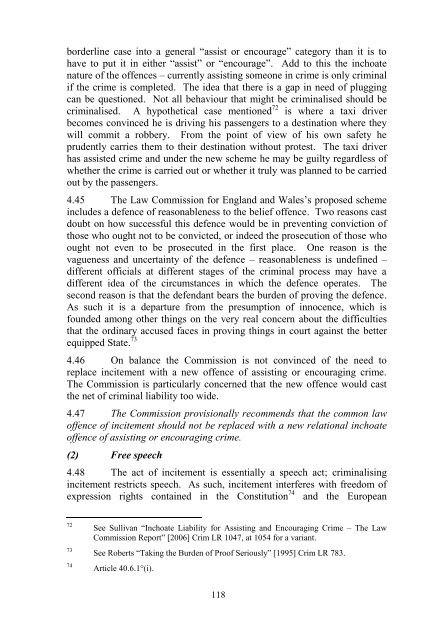Consultation Paper on Inchoate Offences - Law Reform Commission
Consultation Paper on Inchoate Offences - Law Reform Commission
Consultation Paper on Inchoate Offences - Law Reform Commission
You also want an ePaper? Increase the reach of your titles
YUMPU automatically turns print PDFs into web optimized ePapers that Google loves.
orderline case into a general “assist or encourage” category than it is tohave to put it in either “assist” or “encourage”. Add to this the inchoatenature of the offences – currently assisting some<strong>on</strong>e in crime is <strong>on</strong>ly criminalif the crime is completed. The idea that there is a gap in need of pluggingcan be questi<strong>on</strong>ed. Not all behaviour that might be criminalised should becriminalised. A hypothetical case menti<strong>on</strong>ed 72 is where a taxi driverbecomes c<strong>on</strong>vinced he is driving his passengers to a destinati<strong>on</strong> where theywill commit a robbery. From the point of view of his own safety heprudently carries them to their destinati<strong>on</strong> without protest. The taxi driverhas assisted crime and under the new scheme he may be guilty regardless ofwhether the crime is carried out or whether it truly was planned to be carriedout by the passengers.4.45 The <strong>Law</strong> Commissi<strong>on</strong> for England and Wales‟s proposed schemeincludes a defence of reas<strong>on</strong>ableness to the belief offence. Two reas<strong>on</strong>s castdoubt <strong>on</strong> how successful this defence would be in preventing c<strong>on</strong>victi<strong>on</strong> ofthose who ought not to be c<strong>on</strong>victed, or indeed the prosecuti<strong>on</strong> of those whoought not even to be prosecuted in the first place. One reas<strong>on</strong> is thevagueness and uncertainty of the defence – reas<strong>on</strong>ableness is undefined –different officials at different stages of the criminal process may have adifferent idea of the circumstances in which the defence operates. Thesec<strong>on</strong>d reas<strong>on</strong> is that the defendant bears the burden of proving the defence.As such it is a departure from the presumpti<strong>on</strong> of innocence, which isfounded am<strong>on</strong>g other things <strong>on</strong> the very real c<strong>on</strong>cern about the difficultiesthat the ordinary accused faces in proving things in court against the betterequipped State. 734.46 On balance the Commissi<strong>on</strong> is not c<strong>on</strong>vinced of the need toreplace incitement with a new offence of assisting or encouraging crime.The Commissi<strong>on</strong> is particularly c<strong>on</strong>cerned that the new offence would castthe net of criminal liability too wide.4.47 The Commissi<strong>on</strong> provisi<strong>on</strong>ally recommends that the comm<strong>on</strong> lawoffence of incitement should not be replaced with a new relati<strong>on</strong>al inchoateoffence of assisting or encouraging crime.(2) Free speech4.48 The act of incitement is essentially a speech act; criminalisingincitement restricts speech. As such, incitement interferes with freedom ofexpressi<strong>on</strong> rights c<strong>on</strong>tained in the C<strong>on</strong>stituti<strong>on</strong> 74 and the European727374See Sullivan “<strong>Inchoate</strong> Liability for Assisting and Encouraging Crime – The <strong>Law</strong>Commissi<strong>on</strong> Report” [2006] Crim LR 1047, at 1054 for a variant.See Roberts “Taking the Burden of Proof Seriously” [1995] Crim LR 783.Article 40.6.1°(i).118
















